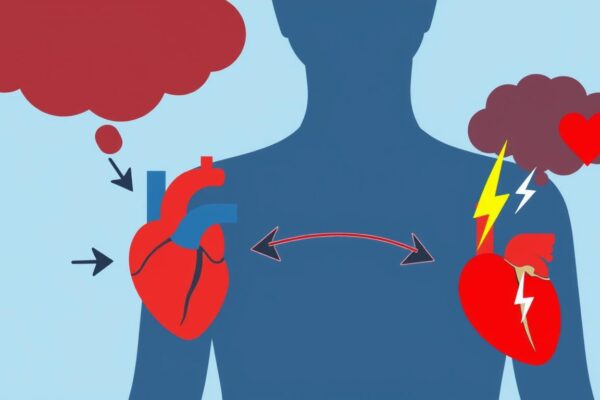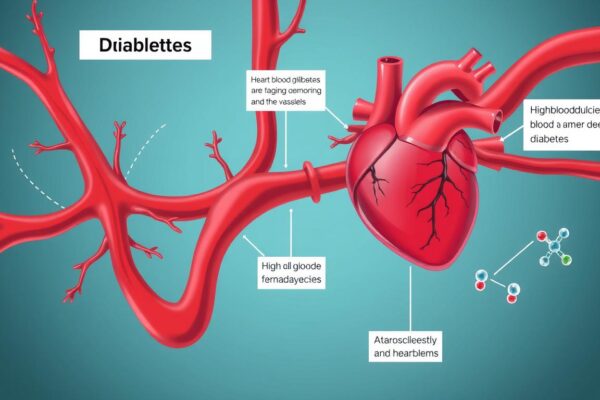Heart Disease: Essential Precautions for a Healthier Life
Your heart’s health is key to your daily energy and long-term well-being. Heart disease is a big killer in the U.S. But, many risks can be managed with smart choices. This guide shows how small steps today can protect you from big health problems tomorrow.

Heart disease and precautions are closely linked. Learning about warning signs, diet, and exercise can lower risks and boost your energy. Small changes like moving more, eating balanced meals, and knowing your health numbers are crucial.
Key Takeaways
- Heart disease risks are preventable with lifestyle adjustments.
- Regular check-ups catch early signs before symptoms appear.
- Precautions like limiting salt and sugar protect heart function.
- Physical activity reduces strain on the heart and improves blood flow.
- Educating yourself on symptoms helps you act fast if issues arise.
Understanding Heart Disease
Your heart health starts with knowing about heart disease. This condition changes how your heart pumps blood and brings oxygen to your body. Learning early can help you act quickly and avoid big problems.
Definition and Causes
Heart disease includes issues like coronary artery disease, arrhythmias, and heart failure. Common reasons include:
- High blood pressure
- Unhealthy cholesterol levels
- Smoking or secondhand smoke exposure
These factors can weaken your heart over time.
Early Warning Signs
Watch out for these signs to keep your heart health in check:
- Chest pain or discomfort
- Shortness of breath during routine tasks
- Frequent dizziness or cold sweats
“Ignoring symptoms like chest pain can delay life-saving care,” warns the American Heart Association.
| Symptom | Possible Cause |
|---|---|
| Chest pressure | Potential artery blockage |
| Weakness | Reduced blood flow to the heart |
Pay attention to your body. If symptoms don’t go away, see a doctor right away.
Heart Disease and Precautions
Making smart choices now helps you prevent heart disease later. Simple daily habits can reduce risks and boost long-term health. Here’s how to start protecting your heart today:
- Move every day: Walk, bike, or dance—aim for 30 minutes most days.
- Eat wisely: Focus on fish, nuts, and colorful veggies to fuel your body right.
- Check hidden risks: Get blood pressure and cholesterol tested yearly.
- Limit salt and sugar: Swap processed snacks for fresh fruits or unsalted nuts.
- Sleep well: 7-9 hours nightly lets your heart recover and recharge.
Small swaps like using olive oil instead of butter or taking the stairs count. Even 10-minute activity bursts add up toward your daily goal. Avoid skipping annual check-ups—they’re your first line of defense.
Protecting your heart isn’t about drastic changes. It’s about building routines that stick. Every healthy choice you make today brings you closer to a stronger, healthier future. Take control by starting with one step that feels doable for you.
Recognizing Heart Disease Risk Factors
Knowing your heart disease risk factors is crucial for your health. Some risks you can’t control, but others you can manage with the right steps.
Genetic Influences
Family history affects heart disease risk. If your relatives have high blood pressure or diabetes, your risk goes up. Traits like familial hypercholesterolemia or hypertension can also increase heart problems. But knowing your risks helps you take steps to prevent them.
Lifestyle and Environmental Triggers
Many heart disease risks come from our daily choices. Smoking, eating too much saturated fat, and not moving enough are big ones. Pollution and stressful jobs can also harm your heart. Making small changes, like quitting smoking or walking more, can help.
“Prevention starts with awareness.” – American Heart Association
- Check family medical history regularly
- Avoid secondhand smoke and polluted areas
- Track cholesterol levels during checkups
Understanding Your Cardiac Health
Knowing your heart’s condition is key to manage heart disease. Start by tracking how you feel daily. Notice changes in energy levels, shortness of breath, or irregular heartbeats. These clues can signal when to seek care.
- Keep a symptom journal to log irregularities and share it with your doctor.
- Monitor blood pressure and cholesterol levels at home using affordable tools.
- Use fitness trackers to watch heart rate patterns during rest and activity.

“Small daily checks can prevent big health crises. Knowledge gives you control.” — American Heart Association
Regular check-ins with your healthcare team are non-negotiable. Ask questions about test results and treatment options. Understand how factors like diet and exercise directly affect your numbers. For example, reducing sodium intake can lower blood pressure, easing strain on your heart.
Take charge of your health by setting realistic goals. Small changes—like walking 30 minutes daily or swapping sugary snacks for fruit—add up. Partner with your doctor to create a plan tailored to your risks. Early awareness turns potential threats into manageable steps toward a stronger, healthier heart.
Practical Steps for Heart Disease Prevention
Keeping your heart healthy is easier than you think. Start with simple steps today. These actions help lower your risk and keep your heart in top shape. Let’s explore how to take charge of your health.
Monitoring Blood Pressure
High blood pressure can harm your arteries without warning. Here’s how to stay on top of it:
- Use a reliable monitor at home to track your blood pressure weekly.
- Aim for readings below 120/80 mmHg for the best health.
- If your readings are over 130/80, talk to your doctor about it.
Cholesterol Management
Keeping your cholesterol in check is key to avoiding plaque. Focus on these numbers:
| Type | Optimal Level | Description |
|---|---|---|
| HDL (“Good” Cholesterol) | Men: ≥40 mg/dL | Women: ≥50 mg/dL | Boost levels with exercise and omega-3 foods. |
| LDL (“Bad” Cholesterol) | Reduce it with diet changes and statins if prescribed. | |
| Total Cholesterol | Regular blood tests track this important marker. |
Regular Health Screenings
Annual check-ups are crucial for catching early signs. Make sure to include these tests:
- Get your blood pressure checked at every doctor visit.
- Have your cholesterol screened every 4–6 months if you’re at risk.
- Get your BMI and waist circumference checked yearly.
Adopting a Heart-Healthy Diet
A heart-healthy diet is key to protecting your heart. It helps lower cholesterol, keeps blood pressure stable, and fights inflammation. Making small changes in what you eat can greatly improve your heart health over time. Let’s look at how to create a diet that’s good for your heart and boosts your overall health.
Nutrient-Rich Foods
Here are the foods that are great for your heart-healthy diet:
- Colorful vegetables like spinach, broccoli, and carrots
- Fruits high in fiber, such as berries, apples, and citrus
- Whole grains like oatmeal and quinoa
- Lean proteins like salmon, beans, and tofu
- Healthy fats from avocados and nuts
Meal Planning Tips
Here are some easy tips to make healthy eating a habit:
- Plan meals for the week to avoid unhealthy choices.
- Read nutrition labels to avoid added sugars and sodium.
- Try grilling or baking instead of frying.
Making small changes, like using olive oil instead of butter or eating walnuts instead of chips, can make a big difference. Keep your diet interesting by trying new things. This way, you’ll stick to it and keep your heart healthy.
The Role of Exercise in Preventing Heart Disease
Moving your body regularly makes your heart and blood vessels stronger. Even small daily activities like walking or gardening can help. They can lower blood pressure and reduce plaque in arteries.
Aim for at least 150 minutes of moderate exercise each week. This is key to a heart-healthy lifestyle that keeps your heart working well.
- Brisk walking, cycling, or swimming improve circulation and oxygen flow.
- Strength training twice a week boosts metabolism and muscle health.
- Yoga or dancing combine stress relief with cardiovascular benefits.
Focus on being consistent rather than how hard you’re working. Start with 10-minute sessions and gradually increase them. Exercise also helps manage weight and blood sugar, which protect your heart.
Need ideas? Try these:
| Exercise Type | Weekly Goal | Heart Benefits |
|---|---|---|
| Walking | 30 mins/day, 5 days/week | Reduces LDL cholesterol |
| Swimming | 2x/week | Low-impact, full-body workout |
| Resistance Training | 2x/week | Strengthens heart muscle |
Make it fun! Work out with friends or to music to stay motivated. Every step you take is a step towards a stronger, healthier heart. Your heart needs movement—it’s the engine of your heart-healthy lifestyle.
Stress Management for Better Cardiac Health
Stress can really weigh on your heart. But, there are simple ways to ease it and boost your cardiac health. Let’s look at how to handle stress better every day.
- Deep breathing: Inhale for 4 counts, hold, exhale for 6. Try this twice daily.
- Mindful walks: Focus on sights/sounds during a 15-minute stroll.
- Journaling: Write down thoughts for 5 minutes before bed.
| Technique | Time Commitment | Cardiac Benefits |
|---|---|---|
| Meditation | 10-15 mins/day | Reduces cortisol, lowers blood pressure |
| Guided imagery | 5-10 mins | Activates relaxation response, improves heart rate variability |
| Yoga | 20-30 mins | Combats inflammation linked to heart strain |
“Chronic stress weakens heart function. Daily stress management is as vital as diet or exercise.” – American Heart Association

Being consistent is crucial. Mix these practices with regular exercise and a healthy diet for the best results. Small steps today can lead to a stronger, healthier heart tomorrow.
The Importance of Sleep in Heart Health
Did you know a good night’s rest does more than help you feel refreshed? Sleep plays a key role in maintaining a healthy heart. When you sleep, your body lowers blood pressure and reduces stress hormones. Poor sleep can strain your heart, increasing risks like high blood pressure or irregular heartbeats.
Think of sleep as time for your heart to “recharge.” Aim for 7–9 hours nightly to let your body repair tissues and manage inflammation. Even one night of little sleep can spike stress levels, putting extra pressure on your heart.
- Stick to a consistent bedtime and wake-up time, even on weekends.
- Create a calming routine: read a book, take a warm bath, or practice deep breathing.
- Avoid screens an hour before bed—the blue light can disrupt sleep cycles.
Small changes make a big difference. Prioritizing sleep isn’t just about feeling energized; it’s a step toward protecting your heart’s long-term health. Your heart works hard all day—give it the rest it needs to keep you thriving.
Tobacco, Alcohol and Heart Disease
Protecting your heart means making smart choices about tobacco and alcohol. These choices greatly impact your heart health. Let’s look at how to make better choices.

Risks of Smoking
Cigarette smoke has over 7,000 chemicals, many bad for your heart. Smoking harms blood vessels, increases blood pressure, and cuts oxygen flow. Secondhand smoke also raises heart attack risks.
- Raises stroke risk by 2-4 times
- Increases blood clot formation
- Weakens artery walls
Moderation and Impact of Alcohol
Alcohol’s effect on heart health varies. Too much drinking can harm the heart, but a little might help. Here’s what you need to know:
| Factor | Risk Level |
|---|---|
| Heavy drinking | High: Linked to irregular heartbeats and weakened heart muscle |
| Moderate intake | Low: Up to 1 drink/day for women, 2 for men |
“Quitting smoking is the single best step toward heart health,” says the American Heart Association. “Limiting alcohol supports long-term wellness.”
Every choice matters. Quit smoking and try stress-reducing activities like walking or yoga. Use apps like MyFitnessPal to keep track of alcohol intake. Small steps today lead to a healthier heart tomorrow.
Regular Check-ups: The Key to Early Detection
Regular check-ups are key to catching heart problems early. They give you a clear view of your heart’s health. This helps you know what to do next. Let’s look at what happens and what to talk about with your doctor.
What to Expect During a Check-Up
- Blood pressure test to measure heart strain.
- Cholesterol screening to assess artery health.
- Discussion of symptoms like chest pain or fatigue.
Questions to Ask Your Doctor
Prepare these questions to get the most from your visit:
| Ask This | Why It Matters |
|---|---|
| What do my latest test results show? | Track progress over time. |
| How do my risk factors compare to averages? | Identify areas needing focus. |
| What lifestyle changes should I prioritize? | Create a personalized plan. |
Proactive questions turn check-ups into action plans. Bring a list and take notes to remember next steps.
Managing Existing Heart Conditions
Keeping your heart healthy is a daily task if you have a heart condition. Your doctor is crucial in helping you adjust treatments and lifestyle. Making small changes every day can ease the strain on your heart and boost your health.
- Take medications exactly as prescribed, never skipping doses.
- Monitor blood pressure and symptoms like shortness of breath regularly.
- Consult your team before starting new exercises or diets.
Even with heart conditions, you can stay active. Choose low-intensity activities like walking or swimming that your doctor approves. Avoid foods high in salt or fat to help your heart. Keeping a journal of your symptoms can help you track patterns and share with your doctor.
Talking to your healthcare team is important. Ask about any side effects, new symptoms, or worries you have. Support groups can connect you with others facing similar challenges, offering advice and support. Always carry emergency contact information and a list of your medications with you.
Integrating Heart-Healthy Habits into Your Lifestyle
Small changes today can lead to big benefits for your heart. Start by focusing on simple adjustments that fit naturally into your daily life. Every step you take—like swapping sugary snacks for fruits or taking a 10-minute walk—adds up over time.
| Everyday Steps | Long-Term Goals |
|---|---|
| Choose water over soda | Replace refined grains with whole grains |
| Take the stairs daily | Plan weekly home-cooked meals |
Pair these actions with support systems. Join a local walking group or use apps like MyFitnessPal to track progress. Celebrate milestones, like sticking to a routine for a month, to stay motivated.
Need extra guidance? Talk to a registered dietitian or check programs like the American Heart Association’s Healthy For Good. They offer free meal plans and community challenges.
Community Resources and Support Networks
Building a strong support network is key to maintaining heart health. You don’t have to face this journey alone. Communities and programs offer guidance, resources, and motivation. Let’s explore the resources available near you and online.
Local Health Programs
Many communities host free or low-cost programs to help you stay on track. Look for:
- Heart health classes at local YMCAs or community centers
- Hospital-led support groups for heart patients
- Walk-a-thons or fitness challenges organized by local clinics
Online Communities
Join digital networks for 24/7 access to advice and encouragement:
- American Heart Association (AHA) online forums
- Facebook groups focused on heart-healthy living
- Apps like Heart360 for tracking progress with peers
| Type | Examples | Benefits |
|---|---|---|
| Local | Community wellness workshops | Face-to-face interaction, hands-on activities |
| Online | Virtual support groups | Accessibility, diverse perspectives |
These networks provide education, peer support, and practical tools to help you meet your goals. Connecting with others builds accountability and reduces stress—key steps in protecting your heart health.
Conclusion
Preventing heart disease starts with small, consistent steps. Eating heart-healthy foods, exercising regularly, and managing stress are key. Swapping processed snacks for fruits or taking a daily walk can make a big difference.
It’s also important to monitor your blood pressure and cholesterol levels. Don’t forget to attend regular check-ups to catch risks early. Getting enough sleep and avoiding tobacco also support your heart health.
Use local health programs or online resources to stay informed and connected. The American Heart Association offers free guides and support groups. Every choice you make today builds a foundation for a stronger heart tomorrow.
Take charge of your health by blending these practices into your routine. Small shifts in habits now can lead to major benefits. Your heart works tirelessly—return the favor by giving it the care it deserves.
Start with one change this week, and let it grow into a lifetime of heart-healthy habits.



